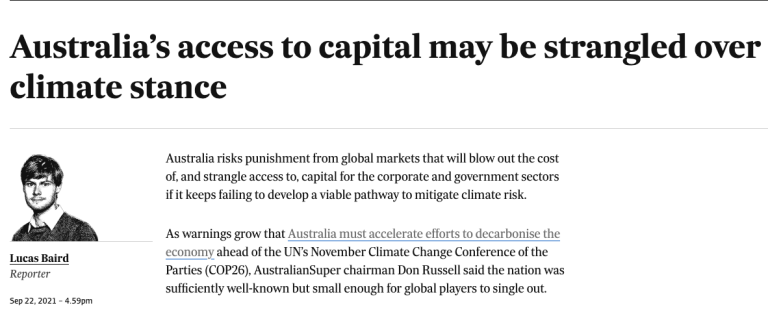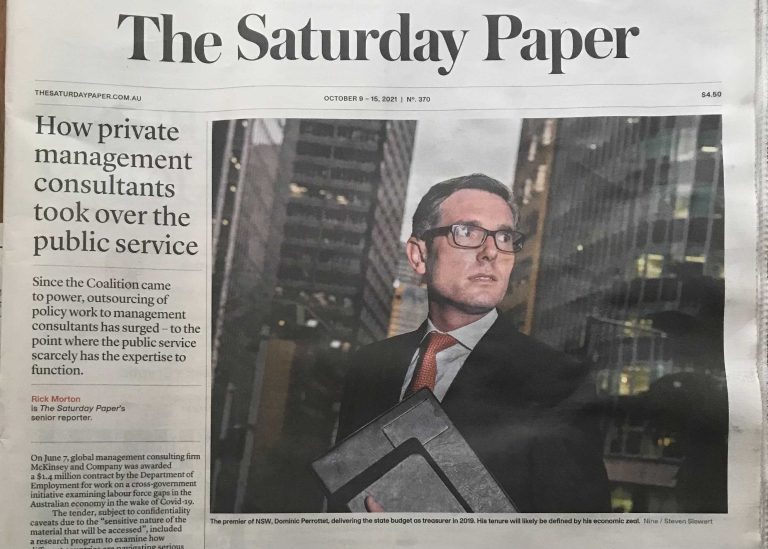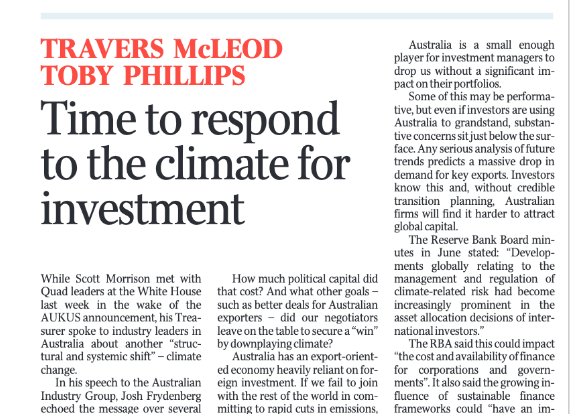A flea imprisoned in a jar will soon learn to jump lower to avoid banging against the
lid, and then keep jumping at that height even if the lid is removed. Once it has learned to limit itself, the flea can never escape the jar.
After eleven years of opposition, Labor is in danger of failing to recognise that the lid
has been lifted on Australian politics. Fortunately, unlike the flea, the ALP is not doomed to be imprisoned by its past.
“We may be seeing a re-awakening of debate on ideas. If so, the 2007 election will be about something more substantial than the budgetary costing of election promises, the disjointed programs targeted at voters in marginal electorates or the misleading claims about competence in economic management. It will be an election about public ideas.”
CPD fellow Ian McAuley wrote these hopeful words in December 2006, after absorbing Kevin Rudd’s ‘Brutopia’ article and his speech to the Centre for Independent Studies. Sadly, in a closely-fought election when it appears that neither party is willing to offend
(or even fail to bribe) a single swinging voter in a single marginal seat, ideas have largely fallen by the wayside and been replaced by the usual uninspiring horse race.
Over the course of the campaign, this has inevitably led to some bad policy on both
sides, for example:
Coalition – the ill-fated takeover of the Mersey hospital illustrates much of what’s wrong with our current approach to health reform: the selective cherry-picking of celebrity problems to cure with a quick cash injection from the policy paramedics in Canberra.
Labor – in a classic demonstration of the inconsistency and fragmentation of our climate policy, they have increased the MRET to 20 per cent, but simultaneously supported the Tasmanian pulp mill, old-growth logging and a nation-wide rollout of desalination plants (Sydney’s planned Kurnell plant alone is expected to generate 945,000 tonnes CO2 a year).
A certain amount of bad policy is to be expected during an election campaign, and to its credit Labor has tried to avoid making policy on the run. Despite the flack that he’s copped for it, Rudd’s endless list of reports, reviews and inquiries is actually a recipe for good policy. It makes sense for parties – especially opposition parties who lack access to the resources for comprehensively modelling and costing policies – to announce broad goals
and basic principles and leave the technical design until after the election.
Assuming the bookies are right and Labor wins by a nose (or a length, depending on what
happens in the marginals), the party is going to face some serious challenges
in government.
When Peter Costello described Australia’s economy as a Formula One racing car, he was being unintentionally honest. Racing cars are designed to go nowhere fast. Very fast. Burning lots of fossil fuels in the process. And then fall apart as soon as they reach the finish line.
It’s a good metaphor for the state of our economy. For a significant number of economists who have been looking beyond the glowing numbers, Australia’s prosperity is increasingly precarious – we are living off our assets and mortgaging our future. The signs that, as Glenn Stevens put it, “the business cycle isn’t dead” are becoming more frequent: a US recession is highly likely, domestic inflation is rising, household debt is at its limit, and climate change is with us.
In this context, it is a shame that Labor has allowed itself to be trapped into adopting tax rates which could easily send us into deficit when the resources boom stops. Given the latest CPI figures and the likelihood of a rate rise, this particular example of “me-tooism” is actually a wasted political opportunity. The government is in a much better position than individuals to time its spending over the business cycle to avoid putting pressure on
inflation. By giving us what opinion polls say we’ve been wanting for years – i.e. more spending on services instead of tax cuts – Labor actually had an opportunity to flip the script on interest rates. In response to the Coalition’s announcement, Rudd and Wayne Swan could have said “hang on, we’re going to wait until the CPI figures come out. If it looks like inflation is going to put too much pressure on interest rates, we won’t pump extra money into the economy straight away but instead hold off, investing the surplus only where it will reduce capacity constraints, increase productivity, or help bring
the cost of living under control. We’d rather increase the resilience of Australia’s
economy than attempt to buy your vote.” This response would have been more consistent
with Rudd’s “economically conservative” stance.
It is tempting to believe that the Coalition is making a scorched-earth retreat, deliberately handing over an overheated economy and laying booby traps for the opposition by planting the idea that any recession on Labor’s watch will have been caused by its industrial relations changes. Of course, should the Howard-Costello team win this election they will be forced to lie in the bed they have made together.
Part of the answer to this challenge lies in what Labor has been doing already: pointing
out the weaknesses in the Coalition’s economic policies, particularly the failure to invest in skills and education, and providing viable alternatives. John Howard made a lot of political capital by choosing issues on which the government is weak (such as health and education), and shifting the debate to grounds on which it has the advantage (such as ‘values’ and ‘choice’). Over eleven years of opposition, and particularly under Rudd’s leadership, Labor has learned to adopt that tactic, using those same issues to attack the government on its home turf (i.e. the strength of the economy).
By building on its policies in preventative health and primary care, early childhood, and
other areas where the social and economic returns on public investment are particularly high, a Labor government could claim the mantle of ‘economic responsibility’ from the Coalition. It is no coincidence that the Coalition – supposedly a proponent of “small government” – has actually increased government spending as a proportion of GDP. Only exceptionally good governments have any chance of shrinking themselves. In the words of Alan Wolfe, “conservatives cannot govern well for the same reason that vegetarians cannot
prepare a world-class boeuf bourguignon: If you believe that what you are called upon to do is wrong, you are not likely to do it very well.” Policies that demonise the vulnerable, ignore root causes, leave the barriers to social mobility in place and fail to treat people as active participants in solving their own problems don’t succeed in reducing spending
over the long-term – they just shift the burden from welfare departments to police and health departments (the NT intervention is a case in point). Likewise a policy of minimal action on climate change doesn’t protect jobs and the economy – it simply shifts the costs from present to future voters.
But, as in any debate, it is not enough just to win the “even if” argument (i.e. “even if their definition of the problem is right, their solutions are wrong or incomplete”). The ‘social investment’ framework makes good sense, and can win widespread support, but by itself it
will capture more minds than hearts.
If it is not to wilt in the shade of Howard’s legacy, a Labor government not only needs to win debates, but to change the terms in which they’re conducted. To do this, it will have to overcome the new political correctness – the reluctance to state the bleeding obvious for fear of being called a bleeding heart.
Over the last few decades Australian public debate has been overly influenced by a very
narrow worldview:
- An unbalanced view of human nature, which divides the whole mysterious and complex species we call humanity into the good who deserve their rewards, and the bad who deserve to be punished.
- An ungenerous view of human motivations, which recognizes only our
self-interest and not the other, equally powerful impulses of love, care and
compassion. - A blinkered view of the economy, which fails to recognize for example that
the economy is a wholly owned subsidiary of the environment, not vice versa,
and that economic progress is a means to an end – that end being the wellbeing
of all Australians.
The dominance of this worldview has been convenient for those who want to shirk the short-term costs of transition to more sustainable practices. It has been convenient for
people who’d like to think of entrenched poverty and social exclusion as somebody else’s problem, and it has been very convenient for politicians who prefer short-term electioneering over long-term leadership.
In Rudd’s speech to the Centre for Independent Studies last year there were hints
that he planned to put some much-needed balance back into Australia’s public debate by tackling this worldview head-on. During this year’s marathon election campaign, he has apparently decided to act as if the lid has been put back on Labor’s jar. Hopefully, if they win, they won’t make the mistake of thinking that their victory means that they can afford to stay at the Coalition’s level.
During the 1996 campaign Howard pledged that he would govern “for all of us”. What he really meant at the time was that he would look after “people like us”, and he went on to
devote great energy to explaining who did and didn’t belong to that exclusive group. But right now we need a government which will take the promise seriously, attempting to cater to the interests of all citizens, not just the ones who voted for it, and certainly not just a handful of swinging voters.
To meet the challenges posed by complex problems like climate change and social exclusion we need a new kind of government – one that builds a sense of trust and shared purpose by inviting citizens to look for common ground. We’ve already solved many of the problems that can be dealt with by straightforward top-down service delivery. What remains are the ‘wicked problems’, the ones that have no win-win, one-shot solutions but instead require policy makers and the subjects of policy to knuckle down for a long-haul process of learning to accommodate their various needs. A future Labor government will need to resist the temptation to mimic the ‘command and control’ style of its predecessor, and instead focus on collaboration, adaptive policy-making and citizen engagement.
And it will need to escape the memory of past defeats and seize this opportunity to
reimagine the future.
This article was first published in the Fabian News and Online Opinion



